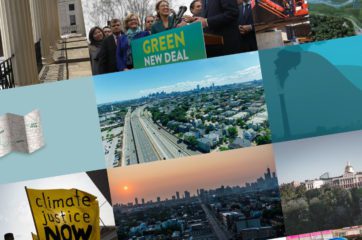In the past few weeks, our social media and television feeds have been flooded with pictures of meat. Why, you might ask, are individuals posting their meat-filled meals for all to see? Well, it’s partly in response to a wildly fabricated piece of misinformation. The latest controversy surrounding our rapidly accelerating climate crisis has taken root in the long-contentious debate over the meat industry’s contributions to climate-warming emissions.
While the U.S. celebrated Earth Week and policymakers reintroduced the Green New Deal, the public became engrossed in the false notion that the government was coming for their meat. The timing aligned well for climate deniers looking to usher in a new piece of misinformation that drowned out the revolutionary proposals for transformational climate action. But despite misleading claims, no one, including President Biden, is planning to take the meat off your plate.
How Did We Get Here?
Globally, food production makes up about a quarter of anthropogenic greenhouse gas emissions, with about 14% of global emissions coming from meat and dairy production alone. This makes the consumption and production of meat a huge contributor to the global climate crisis, larger than global transportation emissions. According to 2016 data, the U.S. is the largest global consumer of meat products per capita, followed by Australia, Argentina, and Uruguay. For Americans concerned about climate change and ecological degradation, it’s logical to view lessening meat consumption as one of the best individual choices we can make to help the issue.
However, we know that misinformation can spread like wildfire. A 2018 study from the Massachusetts Institute of Technology found that misinformation and “fake news” actually spreads faster than facts. “We found that falsehood diffuses significantly farther, faster, deeper, and more broadly than the truth, in all categories of information, and in many cases by an order of magnitude,” said Sinan Aral, a co-author of the report.
It should come as no surprise, then, that when false claims began circulating that President Biden’s climate plan would institute new limitations on meat consumption, thousands of American’s rushed to the defense of meat. About two weeks ago, after policymakers and Biden laid out ambitious emissions reductions and climate plans, reports from conservative politicians and media sources started touting research that indicated Biden’s plan to meet emissions reductions goals involved significant and mandated cuts to meat consumption. The reports were, obviously, a falsity perpetrated by climate deniers and opponents of federal climate action. But, as the MIT research indicates, misinformation spreads quickly, and this fabrication soon dominated the national conversation around climate action.
Wait, What Research?
The research that sparked this absurd bout of misinformation was originally part of a study done by the University of Michigan published in January 2020. The report, Implications of Future US Diet Scenarios on Greenhouse Gas Emissions, sought to examine how lessening meat consumption would impact the U.S. greenhouse gas emissions from our food system. The results were clear: our diet plays a significant role in addressing anthropogenic emissions and the looming climate crisis. The authors write: “Although reliant on a number of simplifying assumptions, this diet projection exercise emphasizes the important role that changes in diet can play in climate action […] Such changes, however, will require the concerted efforts of policymakers, the food industry and consumers. The projection scenarios presented here point to the urgency of such efforts, as decisions made now will have a cumulative impact over the next decade.”
Fuel to the Misinformation Fire
This is not new information. We’ve known about the climate and environmental impacts of the meat industry for years now, so how did research published over a year ago cause such a big stir? The answer is an article published in Daily Mail, a U.K. based entertainment news outlet, titled “How Biden’s climate plan could limit you to eat just one burger a MONTH, cost $3.5K a year per person in taxes, force you to spend $55K on an electric car and ‘crush’ American jobs.”
It’s quite the headline (and quite the article), and there’s a lot to unpack.
Nowhere in Biden’s climate plan — which hasn’t even been formally released — is there any mention of limiting U.S. meat consumption. That’s the first lie. Just like no one is being forced to purchase an electric vehicle (EV), let alone one that costs $55,000. If anything, Biden’s plan will make EV rebates, subsidies, and infrastructure more readily accessible to help EV owners. There’s the second lie. Lastly, economists agree that the costs of taking action on climate change vastly outweigh the costs of letting it continue unchecked. So no, climate action won’t crush American jobs or the economy, it will create a new, long-lasting workforce for the future.
These false notions were powerful fuel for the misinformation fire. Here’s just a brief look at how the Daily Mail article and University of Michigan research — which doesn’t even mention Biden or his climate plan — was weaponized against climate action and shared on social media thousands of times:
The Hamburglar.
“No burgers for thee, but just for me.” pic.twitter.com/vXb4gCGsgW
— Marjorie Taylor Greene 🇺🇸 (@mtgreenee) April 25, 2021
Joe Biden’s climate plan includes cutting 90% of red meat from our diets by 2030. They want to limit us to about four pounds a year. Why doesn’t Joe stay out of my kitchen?
— Lauren Boebert (@laurenboebert) April 24, 2021
I’m pretty sure I ate 4 pounds of red meat yesterday. That’s going to be a hard NO from me. https://t.co/wvGC19cN6R
— Donald Trump Jr. (@DonaldJTrumpJr) April 24, 2021
Larry Kudlow, Host on Fox: “Speaking of stupid, there’s a study coming out of the University of Michigan which says that to meet the Biden Green New Deal targets, America has to, get this, America has to stop eating meat, stop eating poultry and fish, seafood, eggs, dairy, and animal-based fats. Ok, got that? No burger on July 4. No steaks on the barbecue. I’m sure Middle America is just going to love that. Can you grill those Brussels sprouts? So get ready. You can throw back a plant-based beer with your grilled Brussels sprouts and wave your American flag. Call it July 4th Green.”
In an article written by Brian Khan of Earther, he speaks to Stephanie Feldstein, the Center for Biological Diversity’s population and sustainability director, who comments on the research being used to misinform the public about Biden’s plan. She says, “It’s extremely surprising because Biden’s plan hasn’t been released yet and our report came out a year ago […] It’s surprising to me that that’s the one they would latch onto. There’s a growing body of research of many studies [about the topic].”
Meating Denial Head-On
The climate movement was quick to point out that all this huff about limiting meat consumption was a mere fallacy and that no such claim existed within Biden’s climate plan. But even though the claims weren’t true, they were still shared widely. This type of misinformation continues to push false narratives about plans — such as Biden’s climate plan or the Green New Deal — that attempt to address the intersectional nature of climate change and social justice issues. They drown out the extremely positive aspects that climate action holds for not only our planet, but for people too.
While this instance was driven by an out-of-pocket news article, it’s not the only force trying to maintain high levels of meat production and consumption. The meat and dairy industry spend millions of dollars every year lobbying against climate policies and trying to “blur the links between animal agriculture and our climate emergency.” The U.S. government also provides upwards of $30 billion in subsidies to the meat and dairy industry — which quite literally is subsidizing the climate crisis. But not only is the industry lobbying against climate policies, but they’re also working to maintain their social license to operate.
As I watched television the other week, a commercial came on the screen advertising beef, and at first I didn’t think anything of it. But as the commercial went on, I realized that they were advertising beef to parents. The commercial was produced by Beef. It’s What’s For Dinner. — “a national marketing and research program funded by America’s cattle farmers and ranchers.” It depicts babies in highchairs being spoon fed beef with their parents commenting on how their babies love beef or that it was their first solid food because of how nutritious it is. Some of these parents are even saying their child has been eating beef since it was seven months old, and that other parents should consider feeding their children beef from a young age.
You might be asking yourself, why does this matter? It matters because the industry is pushing, similarly to fossil fuels, that beef is a staple to American diets and is intrinsically linked to a healthy, nutritious life notwithstanding its environmental impact. This commercial can help inform the reasoning behind the immediate pushback to even the lie that meat consumption would be limited — it imposes on this idea of meat being inherent to American culture. Climate journalist Emily Atkin takes aim at this idea of glorifying meat consumption, commenting that to continue doing so is just free press for the meat industry. She writes, “In America, we’re taught from a young age that the coolest thing in the world is to be a big man with a big car who eats big meat. This is part of our deeply embedded culture of petromasculinity. It’s why people still get weirdly furious when you suggest eating carrot hot dogs instead of regular hot dogs on the Fourth of July.”
This latest row over meat can give us some keen insights into how to navigate tackling the impact of animal agriculture on climate change, and how policy might need to cater to this established aspect of U.S. culture.









